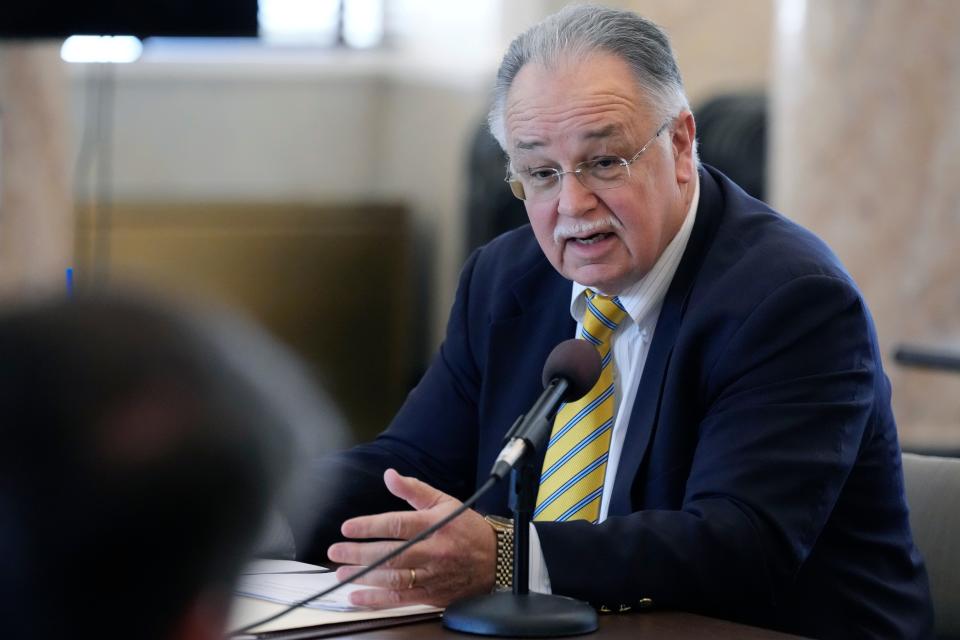MS bills could deny transgender people right to identify with chosen gender
Mississippi lawmakers have moved forward several bills that aim to restrict how transgender people can legally identify, where they can use the bathroom, change their clothes for sporting events and whether they are allowed to room with certain people at college.
One of those bills, House Bill 585, would create a law that allows binary gendered people to force transgender people not to room with them in prisons or college dorms despite how these people identify or if if they have received gender affirming treatments such as a sex change.
"A female shall not have to suffer the indignity of having a male housed with them or be allowed to be put in with them," said Rep. Gene Newman, R-Pearl, who presented HB 585 on March 7. "We have had students come to us complaining that they are being forced to be housed with a male.... that male is a trans woman."
Two other bills, Senate Bill 2753, otherwise known as the Safer Act, and House Bill 1607, dubbed the Mississippi Women's Bill of Rights, would legally bind sex to binary terminology consisting of male and female and seemingly take away lawful recognition of transgender identity in Mississippi. SB 2753 would also restrict trans-people from using certain bathrooms and other gender-assigned places that match their chosen sex.

All three bills passed through their first chamber with large majorities.
A transgender person is someone whose gender identity differs from that typically associated with the sex they were assigned at birth. According to Wise Voter, a data and statistics website, it has reported that about 0.45% of the state's 2.95 million residents identify as transgender, or about 13,000 people. This number may be skewed because some trans people do not reveal their chosen identity because of potential discrimination.
The University of Mississippi Public Relations Department did not respond to several requests for an interview to discuss the school's housing policies, but the school's housing department website states that UM does not base housing assignments on criteria such as race, sexual orientation or gender identity.
Likewise, Mississippi State University, does not strictly have written policies forcing transgender people to be housed with the gender of their birth.
HB 1607 was the only proposed law to see large vocal opposition, with five House Democrats including Bryant Clark of Lexington, Daryl Porter of Summit, and Jackson Reps. Zakiya Summers and Chris Bell all asking what the point was to deny trans people the right to legally identify with their chosen gender.
"Why are you doing this bill?" Clark asked. "We know that in this state and in across this country, there is more than male and female, more than what you are born with."
Rep. Joey Hood, R-Ackerman, who presented the bill to lawmakers in the House, responded only by saying the intent of the bill is simply to define that females and males will legally be designated at birth and that gender can be proven only by what is on a birth certificate."
"What we are saying with this is that what you are born with is what you are," Hood said.
Democrats in the House of Representatives aren't the only ones opposing the bills, however.
Leia Davis, a trans woman and senior journalism student at the University of Mississippi, said that while she came out years after living in a college dorm, the bills seeking to restrict her rights or those that would force her into a prison with men would not only be a failure from the state to recognize who she is, but would also put her in harm's way.
"It would absolutely be a threat to my safety because I am not a man anymore," Davis said. "I'm a woman and to be housed with men would put me in danger of certainly sexual assault, or other types of assault. So ostensibly, the bill is meant to protect cisgendered women, but inevitably, it will put transgender women in harm and transgender men as well."
But Republican lawmakers in the House aren't only seeking to prevent trans people from using those spaces with cis-gendered people. SB 2753 would take that a step further by adding that if these people were to ignore the new law, they could be sued or prosecuted by those who feel their privacy was violated while sharing that space. That bill passed the Senate, 40-12.
Reeves blocks trans athletes in schools Mississippi governor signs bill limiting transgender athletes
More on Reeves thoughts on trans laws Mississippi Senate passes limit on transgender health care
"This is meant to protect the privacy of males and females," SB 2753 sponsor and Finance Committee Chair Sen. Josh Harkins, R-Flowood, said.
HB 1607, which passed the House, 82-30, would not provide for any form of prosecution against or directly restrict trans people from using gender-assigned rooms in public places.
Jaime Harker, director of the Sarah Isom Center for Women and Gender Studies at the University of Mississippi and owner of the state's only LGBTQ and feminist bookstore, Violet Valley Bookstore, said that laws that target restrictions on the state's transgender population do nothing but more people in danger. Harker did not speak to the Clarion Ledger as an official representative of Ole Miss.

"This targeting of trans people makes an already vulnerable population less safe, and it does nothing to make women safer," Harker said. "What is dangerous about such legislation is that it can lead to increased bullying and hate crimes in the larger community."
These bills will now be considered in the advancing chamber, where lawmakers will have until midnight on April 2 to either send those bills to Republican Tate Reeves for final consideration, who has in the past signed legislation to restrict minors from gender-changing treatments and from playing in opposite sex sports.
Grant McLaughlin covers state government for the Clarion Ledger. He can be reached at gmclaughlin@gannett.com or 972-571-2335.
This article originally appeared on Mississippi Clarion Ledger: Mississippi bills seeking to limit transgender identity move forward

